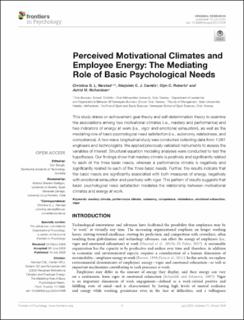Perceived Motivational Climates and Employee Energy: The Mediating Role of Basic Psychological Needs
| dc.contributor.author | Nerstad, Christina G. L. | |
| dc.contributor.author | Caniëlis, Marjolein | |
| dc.contributor.author | Roberts, Glyn C. | |
| dc.contributor.author | Richardsen, Astrid Marie | |
| dc.date.accessioned | 2022-03-08T15:32:42Z | |
| dc.date.available | 2022-03-08T15:32:42Z | |
| dc.date.created | 2020-06-11T13:01:52Z | |
| dc.date.issued | 2020 | |
| dc.identifier.citation | Front. Psychol., 10 July 2020 | en_US |
| dc.identifier.issn | 1664-1078 | |
| dc.identifier.uri | https://hdl.handle.net/11250/2983856 | |
| dc.description.abstract | This study draws on achievement goal theory and self-determination theory to examine the associations among two motivational climates (i.e., mastery and performance) and two indicators of energy at work (i.e., vigor and emotional exhaustion), as well as the mediating role of basic psychological need satisfaction (i.e., autonomy, relatedness, and competence). A two-wave longitudinal study was conducted collecting data from 1,081 engineers and technologists. We applied previously validated instruments to assess the variables of interest. Structural equation modeling analyses were conducted to test the hypotheses. Our findings show that mastery climate is positively and significantly related to each of the three basic needs, whereas a performance climate is negatively and significantly related to each of the three basic needs. Further, the results indicate that the basic needs are significantly associated with both measures of energy, negatively with emotional exhaustion and positively with vigor. This pattern of results suggests that basic psychological need satisfaction mediates the relationship between motivational climates and energy at work. | en_US |
| dc.language.iso | eng | en_US |
| dc.publisher | Frontiers | en_US |
| dc.rights | Navngivelse 4.0 Internasjonal | * |
| dc.rights.uri | http://creativecommons.org/licenses/by/4.0/deed.no | * |
| dc.title | Perceived Motivational Climates and Employee Energy: The Mediating Role of Basic Psychological Needs | en_US |
| dc.type | Journal article | en_US |
| dc.type | Peer reviewed | en_US |
| dc.description.version | publishedVersion | en_US |
| dc.source.journal | Frontiers in Psychology | en_US |
| dc.identifier.doi | 10.3389/fpsyg.2020.01509 | |
| dc.identifier.cristin | 1815045 | |
| cristin.ispublished | true | |
| cristin.fulltext | original | |
| cristin.qualitycode | 2 |
Tilhørende fil(er)
Denne innførselen finnes i følgende samling(er)
-
Scientific articles [2147]

